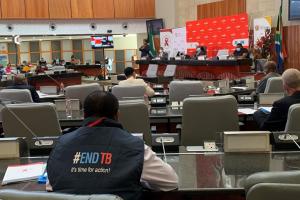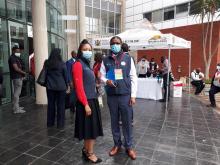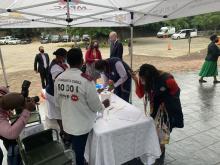The UN family in South Africa will continue to support the Country towards achieving commitments to End TB
TB is still one of the top infectious killers in the world, with 1.4 million people having died from TB in 2019. Meanwhile, Drug-resistant TB remains a public health crisis which is estimated to affect 77,000 Africans each year. The African region accounts for 25% of the global TB burden, with more than 500,000 African lives lost to this disease every year. Of these deaths, 58 000 were in South Africa.
In South Africa HIV and TB remain colliding epidemics with 62% of TB deaths being among people living with HIV. In 2019 there were 360 000 new TB infections, 58% of them were in people living with HIV. On the other hand, TB was the cause of death for half of all HIV-related death (36 000 out of 72 000) in 2019. This underscores the importance of integrated TB and HIV interventions and services.
Presenting a message of support on behalf of the UN family in South Africa at this year’s National World TB Day (WTBD) commemoration, the WHO Representative in South Africa, Dr Owen Kaluwa, called on the government and other stakeholders to bridge the financial gap for the TB response and to accelerate efforts towards achieving the targets and commitments to End TB, for the benefit of the South African population and her future generations.
“The UN family in South Africa will continue to support the country to make this a reality”.
The WTBD event was held in Nelsrpuit, Mpumalanga Province under strict compliance with COVID-19 public gatherings measures.
The event was attended by South Africa’s Deputy President, David Mabuza, and also in his capacity as the Chairperson of the South African National Aids Council. He was accompanied by the Minister of Health, Dr Zweli Mkhize; Mpumalanga Province Premier, Ms Refilwe Mtshweni-Tsipane, and SANAC sector leaders. Development partners, other than WHO, US Mission to South Africa Representative, Mr Todd Haskell, and the Joint United Nations Programme on HIV/AIDS (UNAIDS) Representative in South Africa, Dr. Mbulawa Mugabe.
As one of the 30 countries with a high burden of TB, the Deputy President told the gathering that “we are joining the world to galvanize our own society to realize that “The Clock is Ticking: Let’s Find, Treat, and End TB Now”
All South Africans were called to rally behind the national efforts to end TB and the scaling up of the national response through urgently finding, initiating and retaining TB clients in treatment and care.
The National Strategic Plan on HIV, TB and STIs launched in 2017, would remain the guiding implementation blue-print that enables multi-stakeholder participation and collaboration in the fight against HIV, TB and STIs. The plan is to diagnose at least 90% of all people infected with TB, treat 100 percent of those who have tested positive, and decrease TB deaths by at least 30 percent.
Dr Kaluwa, told the audience that this year’s theme “The clock is ticking” reminds everyone that “we are running out of time to reach the targets set in the Sustainable Development Goals, the End TB Strategy, the Moscow Declaration to End TB and the political declaration of the UN High-Level Meeting on TB.
“This reminder is especially critical in the context of the COVID-19 pandemic that we find ourselves battling as a nation. The pandemic has indeed put at risk, the gains that we have made towards Ending TB, highlighting the need for equitable access to prevention and care, in line with WHO’s drive towards achieving Universal Health Coverage”
WHO's contributions to the TB programme in South Africa has been made possible in previous years with the generous funding from the United States Agency For International Development (USAID).


